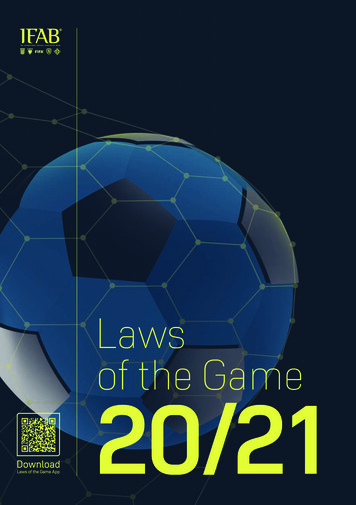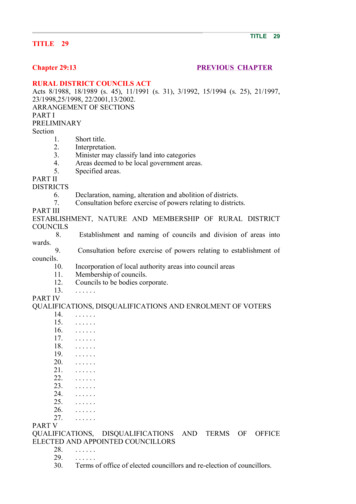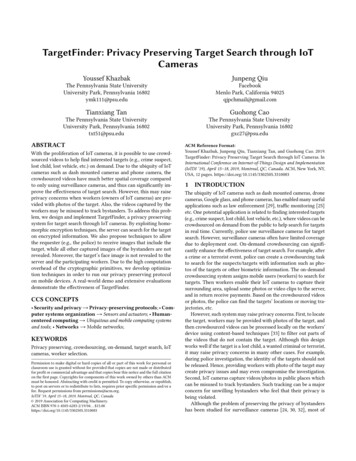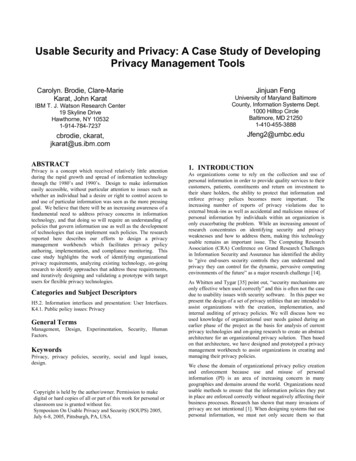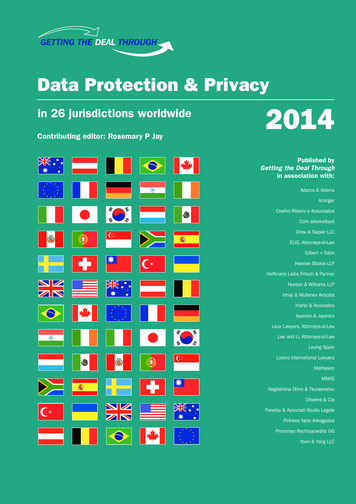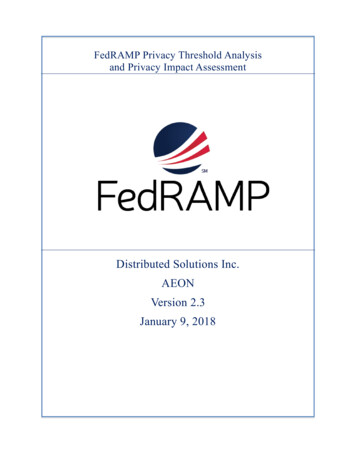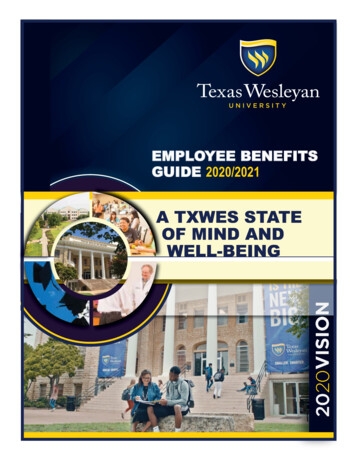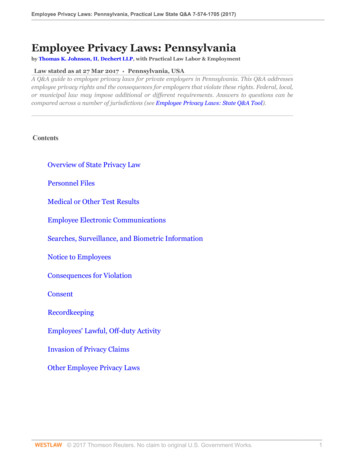
Transcription
Employee Privacy Laws: Pennsylvania, Practical Law State Q&A 7-574-1705 (2017)Employee Privacy Laws: Pennsylvaniaby Thomas K. Johnson, II, Dechert LLP, with Practical Law Labor & EmploymentLaw stated as at 27 Mar 2017 Pennsylvania, USAA Q&A guide to employee privacy laws for private employers in Pennsylvania. This Q&A addressesemployee privacy rights and the consequences for employers that violate these rights. Federal, local,or municipal law may impose additional or different requirements. Answers to questions can becompared across a number of jurisdictions (see Employee Privacy Laws: State Q&A Tool).ContentsOverview of State Privacy LawPersonnel FilesMedical or Other Test ResultsEmployee Electronic CommunicationsSearches, Surveillance, and Biometric InformationNotice to EmployeesConsequences for ViolationConsentRecordkeepingEmployees' Lawful, Off-duty ActivityInvasion of Privacy ClaimsOther Employee Privacy Laws 2017 Thomson Reuters. No claim to original U.S. Government Works.1
Employee Privacy Laws: Pennsylvania, Practical Law State Q&A 7-574-1705 (2017)Overview of State Privacy Law1. Please list each state law relating to employee privacy (for example, employeeright to privacy, access to personnel files, electronic communications, surveillance andmonitoring, medical examinations, and lawful off-duty activity laws), EXCEPT state lawson background checks and drug testing. For each, please describe: What activity the law protects.Which employers are covered.Which employees are covered, including any exceptions for interns, independentcontractors, minors, or others.Whether the law protects employees from their co-workers' actions in addition totheir supervisor's actions.Whether it provides for a private right of action.For statutes and regulations, the entity that administers the statute or regulation(s).The Pennsylvania Wiretapping and Electronic Surveillance Control Act: 18 Pa.C.S.A. §§ 5701 to 5782Protected ActivityThe Pennsylvania Wiretapping and Electronic Surveillance Control Act (Wiretap Act) limits anindividual or entity's ability to monitor another's activities and communications (18 Pa. C.S.A. §§ 5701to 5782). Under the Wiretap Act, it is a third degree felony to intentionally do or attempt to do any ofthe following to any wire, electronic, or oral communication without all parties' consent: Intercept.Disclose.Use.(18 Pa. C.S.A. § 5703; Commonwealth v. Deck, 954 A.2d 603, 609 (Pa. 2008).)For example, in Commonwealth v. Saccol, an employer was convicted under the Wiretap Act after hewiretapped the phones at his dry cleaning business to record his employee's personal calls (557 A.2d1095 (Pa. 1989)).However, the Wiretap Act does not apply: When all parties to a communication have given prior consent.To personnel of a business engaged in telephone marketing or telephone customer service if: the business only uses the interceptions for training, quality control, or monitoring; and one party in the communication consented to the interception. 2017 Thomson Reuters. No claim to original U.S. Government Works.2
Employee Privacy Laws: Pennsylvania, Practical Law State Q&A 7-574-1705 (2017)(18 Pa. C.S.A. § 5704(4), (15).)Unless extended by the Pennsylvania State Legislature, the law expires on December 31, 2018 (18 Pa.C.S.A. § 5781).Covered EmployersThe law covers all persons, which is defined as any: Individual.Partnership.Association.Joint stock company.Trust.Corporation.Federal employee or agent.State or local government employee or agent.(18 Pa. C.S.A. § 5702.)Covered EmployeesAll individuals are covered under this law (see Covered Employers).Co-Worker ViolationsThe law does not address co-worker violations.Private Right of ActionAn aggrieved person generally may file a civil action against another party if the other person does orcauses another person to do any of the following to the person's wire, electronic, or oral communication: Intercept.Disclose.Use in violation of the Wiretap Act.(18 Pa. C.S.A. § 5725(a).)AdministrationThe law does not specify an entity for administration. 2017 Thomson Reuters. No claim to original U.S. Government Works.3
Employee Privacy Laws: Pennsylvania, Practical Law State Q&A 7-574-1705 (2017)The Pennsylvania Inspection of Employment Records Law (Personnel Files Act):43 P.S. §§ 1321 to 1324Protected ActivityUnder the Personnel Files Act, an employee has a right to review files that contain information aboutthe employee that the employer maintains (43 P.S. § 1322). For a list of covered files, see Question 2.Covered EmployersAll public and private employers in Pennsylvania are covered under this law (43 P.S. § 1321).Covered EmployeesThe Personnel Files Act defines an employee as any person currently: Employed.Laid off with recall rights.On a leave of absence.However, this law excludes applicants for employment and any other person. (43 P.S. § 1321.)Pennsylvania courts have held that "any other person" includes former employees (Beitman v. Dep't ofLabor & Indus., 675 A.2d 1300, 1302 (Pa. Commw. Ct. 1996)). However, the court in Beitman v Dep'tof Labor & Indus. also noted in dicta that the phrase "currently employed" may apply to certain formeremployees who request to inspect their personnel files either contemporaneously with their terminationor within a reasonable time immediately following termination (Beitman, 675 A.2d at 1302).Co-Worker ViolationsThe law does not address co-worker violations.Private Right of ActionThe law does not specify a private right of action. An aggrieved individual must exhaust all internal andadministrative remedies (43 P.S. § 1324).AdministrationThe Pennsylvania Department of Labor and Industry, Bureau of Labor Standards (BLS) administersand enforces this law (43 P.S. § 1324).Confidentiality of HIV-Related Information Act: 35 P.S. §§ 7601 to 7612 2017 Thomson Reuters. No claim to original U.S. Government Works.4
Employee Privacy Laws: Pennsylvania, Practical Law State Q&A 7-574-1705 (2017)Protected ActivityThe Confidentiality of HIV-Related Information Act (Information Act) provides broad confidentialityfor HIV-related information to protect individuals from inappropriate disclosure and subsequentmisuse of the information (35 P.S. § 7602(a)). Under this law, a person cannot disclose another person'sHIV-related information without that person's written consent, except in the limited situations specifiedin the statute (35 P.S. § 7607).Covered EmployersThe Information Act covers all persons, which includes all employers in Pennsylvania (35 P.S. § 7607).Covered EmployeesThe law covers all individuals for whom confidential HIV-related information exists.Co-Worker ViolationsThe law does not address co-worker violations.Private Right of ActionAn aggrieved individual has a private right of action under this law (35 P.S. § 7610).AdministrationThe law does not specify the entity that administers this law.Pennsylvania Drug and Alcohol Abuse Control Act: 71 P.S. §§ 1690.101 to 1690.115Protected ActivityThe Pennsylvania Drug and Alcohol Abuse Control Act (PADAACA) requires that patient records andother information prepared or maintained by county-based prevention, intervention, and treatmentprograms for drug and alcohol abuse be treated as confidential. The records or information may onlybe disclosed: With the patient's consent.Either to: medical personnel to diagnose and treat the patient; or government or other officials to obtain benefits for the patient as a result of the condition.(71 P.S. § 1690.108.) 2017 Thomson Reuters. No claim to original U.S. Government Works.5
Employee Privacy Laws: Pennsylvania, Practical Law State Q&A 7-574-1705 (2017)However, the records may be disclosed without written consent either: During an emergency where the patient's life is in immediate jeopardy.In accordance with a court order.(71 P.S. § 1690.108.)Covered EmployersThe law is not specific to employers, but covers all individuals and entities in Pennsylvania for whomdrug and alcohol treatment records exist.Covered EmployeesThe law covers all individuals in Pennsylvania.Co-Worker ViolationsThe law does not address co-worker violations.Private Right of ActionThe law does not specify a private right of action.AdministrationThe PADAACA does not specify an entity that administers this law.Breach of Personal Information Notification Act: 73 P.S. §§ 2301 to 2329Protected ActivityThe Pennsylvania Breach of Personal Information Notification Act (BPINA) requires an entity thatmaintains, stores, or manages computerized data that includes personal information to provide noticeof any breach of the data system's security after discovering a breach of the system's security. Thenotice must be sent "without unreasonable delay" to any Pennsylvania resident whose unencrypted andunredacted personal information was or is reasonably believed to have been accessed and acquired byan unauthorized person. (73 P.S. § 2303(a).)Under the BPINA, personal information is an individual's first name or first initial and last name, withone or more of any of the following unredacted or unencrypted information: Social Security number.Driver's license number or state identification card number issued in lieu of a driver's license. 2017 Thomson Reuters. No claim to original U.S. Government Works.6
Employee Privacy Laws: Pennsylvania, Practical Law State Q&A 7-574-1705 (2017) Financial account, credit or debit card number, with any required code or password that allowsaccess to an individual's financial account.This does not include publicly available information that is lawfully made available to the general publicfrom federal, state, or local government records. (73 P.S. § 2302(a).)Covered EmployersAll entities that maintain, store, or manage computerized data that includes personal information arecovered under this law (73 P.S. § 2303).Covered EmployeesAll individuals in Pennsylvania are covered under this law (73 P.S. § 2303).Co-Worker ViolationsThe law does not address co-worker violations.Private Right of ActionThere is no private right of action under this law (73 P.S. § 2308).AdministrationThe Pennsylvania Attorney General (PAAG) administers and enforces this law (73 P.S. § 2308).Privacy of Social Security Numbers: 74 P.S. § 201Protected ActivityTitle 74, Section 201 of the Pennsylvania Statutes prohibits a person, entity, or state entity from: Publicly posting or displaying an individual's Social Security number.Printing a Social Security number on any card required for an individual to access products by theperson, entity, or state agency.Requiring an individual to send a Social Security number online using an unencrypted connection.Requiring an individual to use the individual's Social Security number to access a website.Printing a Social Security number on materials that are mailed to an individual, unless otherwiselegally required.Disclosing the Social Security number of a person who applies for a recreational license.(74 P.S. § 201.) 2017 Thomson Reuters. No claim to original U.S. Government Works.7
Employee Privacy Laws: Pennsylvania, Practical Law State Q&A 7-574-1705 (2017)Covered EmployersAll persons, entities, and state agencies are covered under this law.Covered EmployeesAll individuals in Pennsylvania are covered under this law.Co-Worker ViolationsThe law does not address co-worker violations.Private Right of ActionThe law does not provide for a private right of action.AdministrationThe PAAG administers and enforces this law (74 P.S. § 201(g)).The Mental Health Procedures Act: 50 P.S. §§ 7101 to 7503Protected ActivityUnder Title 50, Section 7111 of the Pennsylvania Statutes, documents about a person's treatment for amental health condition cannot be disclosed without the person's written consent, except to: Parties that provide treatment for the person.The county administrator.A court, in the course of legal proceedings under this law.Follow federal law governing disclosure of patient information, if treatment is by a federal agency.(50 P.S. § 7111.)The confidentiality provisions apply to all: Involuntary treatment of a mental illness, whether inpatient or outpatient.Voluntary treatment of a mental illness requiring at least part-time residence in a facility.(50 P.S. § 7103.)Covered EmployersAll persons, entities, and state agencies are covered under this law. 2017 Thomson Reuters. No claim to original U.S. Government Works.8
Employee Privacy Laws: Pennsylvania, Practical Law State Q&A 7-574-1705 (2017)Covered EmployeesAll individuals in Pennsylvania are covered under this law.Co-Worker ViolationsThe law does not address co-worker violations.Private Right of ActionAggrieved individuals have a private right of action under this law (50 P.S. § 7113).AdministrationThe law does not specify an entity that administers this law.Personnel Files2. For any law in Question 1 regarding employer maintenance of personnel files, pleasedescribe: What constitutes a personnel file in your jurisdiction.Which records employers must maintain and for how long.Any records that must be kept separately.Any records that should not be included in an employee's personnel file.How records must be maintained (for example, in digital or paper form, or in lockeddrawers or rooms).Any requirements or prohibitions regarding destruction of records.Definition of Personnel FileUnder the Pennsylvania Inspection of Employment Records Law (Personnel Files Act), a personnel fileincludes: An employment application.Wage or salary information.Notices of commendations, warning, or discipline. 2017 Thomson Reuters. No claim to original U.S. Government Works.9
Employee Privacy Laws: Pennsylvania, Practical Law State Q&A 7-574-1705 (2017) Authorization for a deduction or withholding of pay.Fringe benefit information.Leave records.Employment history with the employer, including: salary information; job title; dates of changes; retirement record; attendance records; and performance evaluations.(43 P.S. § 1321.)Although case law is limited, Pennsylvania courts have held that letters of reference in academic peerreviews for tenure prepared by fellow faculty members are performance evaluations and considered partof a personnel file. However, letters of reference prepared by a third party who is independent of theemployer's control do not constitute performance evaluations and are outside the scope of a personnelfile. (See Univ. of Pittsburgh v. Dep't of Labor & Indus., 896 A.2d 683 (Pa. Commw. 2006); LafayetteColl. v. Dep't of Labor & Indus., 546 A.2d 126 (Pa. Commw. 2006).)Required Records and Maintenance PeriodThe Personnel Files Act does not: Require an employer to create or maintain particular records.Specify a maintenance period for the records.However, other Pennsylvania employment-related laws, such as wage and hour, wage payment, andfair employment practices laws, require employers to create and maintain certain personnel records.Employers that maintain records under other employment-related laws must make them available tothe employee for inspection if those documents are deemed personnel files under the Personnel FilesAct. The Personnel Files Act covers all documents that meet the statutory definition of a personnel file,even if a supervisor keeps the document separately or informally.Separate RecordsThe Personnel Files Act does not require that particular personnel file records be kept separately.Exclusions from Personnel FilesUnder the Personnel Files Act, a personnel file does not include: An employee's records relating to the investigation of a possible criminal offense.Letters of reference.Documents developed or prepared for use in civil, criminal, or grievance procedures.Medical records or materials used by the employer to plan for future operations.Information available to the employee under the Fair Credit Reporting Act. 2017 Thomson Reuters. No claim to original U.S. Government Works.10
Employee Privacy Laws: Pennsylvania, Practical Law State Q&A 7-574-1705 (2017)(43 P.S. § 1321.)How to Maintain RecordsThe Personnel Files Act does not specify the manner in which files must be maintained.Destruction of RecordsThe Personnel Files Act does not specify the manner in which files must be maintained.3. For any law in Question 1 regarding employee access to personnel files, please describe: Who may access the files, such as employees, applicants, and former employees.Whether individuals may copy the files or only inspect them.When access must be granted (and whether it must be granted within a set periodof time).Any limitations on access.Right of AccessUnder the Pennsylvania Inspection of Employment Records Law (Personnel Files Act), when requestedby an employee, an employer must allow the employee or the employee's designated agent to inspectthe employee's personnel files used to determine the employee's qualifications for: Employment.Promotion.Additional compensation.Termination.Disciplinary action.(43 P.S. § 1322.)The employer must make the records available during the regular business hours of the office where therecords are usually and ordinarily maintained, when sufficient time is available during the course of aregular business day, to inspect the personnel files in question. The employer may require the requestingemployee or the employee's designated agent to: Inspect the records on the employee's or agent's free time.File a written form requesting access to the files or to designate an agent to access and inspectthe file.State in the written request either or both: 2017 Thomson Reuters. No claim to original U.S. Government Works.11
Employee Privacy Laws: Pennsylvania, Practical Law State Q&A 7-574-1705 (2017) the purpose for which the inspection is being requested; orthe particular parts of the personnel record to be inspected.(43 P.S. § 1322.)However, the Personnel Files Act does not require an employer to produce a personnel record in thecontext of a workers' compensation hearing (Tady v. Workers' Comp. Appeal Bd., 485 A.2d 897,900 (Pa. Commw. 1985)).Copying or InspectionUnder the Personnel Files Act, an employee must have access to the employee's personnel files forinspection. The employee or the employee's agent may take notes during the inspection. However, theemployer is not required to allow the employee or the agent to: Remove the personnel file from the employer's premises.Make or obtain a copy of the personnel file's contents.In addition, the employer may require that the file be inspected in the presence of an official that theemployer designates. (43 P.S. § 1323.)Required Response TimeThe Personnel Files Act does not specify a time limit for the employer to respond to an employee requestfor file access. However, the law specifies that if the employee makes a request, the employer mustpermit inspection at reasonable times. (43 P.S. § 1322.)Limitations on AccessExcept for reasonable cause, an employer may limit inspection of a personnel file to once every calendaryear by an employee and once every calendar year by the employee's designated agent (43 P.S. § 1323).Medical or Other Test Results4. For any law in Question 1 that protects employees from medical examinations,including AIDS/HIV tests, or other tests, such as psychological or personality tests,please describe any limitations on access to test results or the protection of records. 2017 Thomson Reuters. No claim to original U.S. Government Works.12
Employee Privacy Laws: Pennsylvania, Practical Law State Q&A 7-574-1705 (2017)Confidentiality of HIV-Related Information Act: 35 P.S. §§ 7601 to 7612Under the Confidentiality of HIV-Related Information Act (Information Act), a person who obtainsconfidential HIV-related information while providing any health or social service may only disclose thatinformation to the following persons: The subject.The physician who ordered the test.A person specifically designated in a written consent.An agent, employee, or medical staff member of the healthcare provider involved in treating orproviding medical care to the subject when a healthcare provider has received confidential HIVrelated information during the subject's diagnosis or treatment by the healthcare provider.Certain peer review organizations, individual healthcare providers, insurers, departments ofhealth and local boards, and county agencies.A person allowed access to the information by court order.A funeral director responsible for the acceptance and preparation of the deceased subject.Recipients of confidential HIV-related information cannot disclose the information again unless theInformation Act specifies otherwise. (35 P.S. § 7607.)Pennsylvania Drug and Alcohol Abuse Control Act: 71 P.S. §§ 1690.101 to 1690.115Under the Pennsylvania Drug and Alcohol Abuse Control Act, patient records prepared or maintainedby county-based drug and alcohol abuse treatment facilities and programs must remain confidential.The records may only be disclosed: With the patient's consent.To medical personnel exclusively for the patient's diagnosis and treatment.To government or other officials to obtain benefits for the patient for the patient's substance abuseor dependence.In an emergency where the patient's life is in danger.In accordance with a court order.(71 P.S. § 1690.108.)The Mental Health Procedures Act: 50 P.S. §§ 7101 to 7503Under the Mental Health Procedures Act (MHPA), documents about a person's treatment for a mentalhealth condition cannot be disclosed without the person's written consent, except to: Parties that provide treatment to the person.The county administrator.A court, in the course of legal proceedings under this law.Following federal law governing disclosure of patient information, if treatment is by a federalagency.(50 P.S. § 7111.) 2017 Thomson Reuters. No claim to original U.S. Government Works.13
Employee Privacy Laws: Pennsylvania, Practical Law State Q&A 7-574-1705 (2017)The confidentiality provisions apply to all: Involuntary treatment of a mental illness, whether inpatient or outpatient.Voluntary treatment of a mental illness requiring at least part-time residence in a facility.(50 P.S. § 7103.)Employee Electronic Communications5. For any law in Question 1 that governs the monitoring or recording of employees'electronic communications, please describe what monitoring or recording is permitted orprohibited in each of the following media: Telephone.Internet.Email.Other.The Pennsylvania Wiretapping and Electronic Surveillance Control Act: 18 Pa.C.S.A. §§ 5701 to 5782Telephone CommunicationsUnder the Pennsylvania Wiretapping and Electronic Surveillance Act (Wiretap Act), a person cannotintentionally: Intercept or attempt to intercept wire, electronic, and oral communications.Use or disclose or attempt to use or disclose the contents of a nonconsensual, intentionallyintercepted communication.(18 Pa. C.S.A. § 5703.)A telephone conversation is protectable as an oral or wire communication (Deck, 954 A.2d at 609).Under the Wiretap Act: An oral communication is any communication made orally by a person who has an expectation thatthe communication is not subject to interception under circumstances justifying the expectation.A wire communication is any aural transfer made in whole or in part through facilities that transmitor communicate by wire, cable, or other connection between the point of origin and the point ofreception, including any electronic storage of the communication. 2017 Thomson Reuters. No claim to original U.S. Government Works.14
Employee Privacy Laws: Pennsylvania, Practical Law State Q&A 7-574-1705 (2017)(18 Pa. C.S.A. § 5702.)Therefore, a telephone conversation is covered under the Wiretap Act even when a person on a telephoneconversation had no reasonable expectation of privacy (for example, on speakerphone). (Deck, 954 A.2dat 609.)The exceptions to the Wiretap Act are: When all parties to a communication have given prior consent.For personnel of a business engaged in telephone marketing or telephone customer service if: the interceptions are made solely for training, quality control, or monitoring by the business;and one party in the communication has consented to the interception.(18 Pa. C.S.A. § 5704(4), (15).)Internet Usage and Email CommunicationsIn Commonwealth v. Proetto, the court found that the act of sending email demonstrates that the senderexpressly consents to the recording, similar to leaving a voicemail message where the caller knows themessage is being recorded (771 A.2d 823, 830 (Pa. Super. Ct. 2001)).Other Forms of CommunicationText messages constitute an electronic communication under the Wiretap Act (Commonwealth v. Koch,39 A.3d 996, 1003 (Pa. Super. Ct. 2011)). In addition, text messages do not require an expectation ofprivacy on the sender's behalf to constitute an electronic communication under the Wiretap Act (18 Pa.C.S.A. § 5702).Searches, Surveillance, and Biometric Information6. For any law in Question 1 that governs searches and surveillance, please describe: Any limits on employer searches (such as searches in common areas or individualoffices).What kind of surveillance, tracking, or monitoring of workplaces or employees ispermitted (such as by GPS or video, or surveillance of an employee's computeror phone usage) and whether there are any limitations on the areas that can bemonitored or recorded.Any limits on the use of biometric information (such as fingerprint, retina, orvoiceprint scans used for identification). 2017 Thomson Reuters. No claim to original U.S. Government Works.15
Employee Privacy Laws: Pennsylvania, Practical Law State Q&A 7-574-1705 (2017)Workplace SearchesIn Pennsylvania, workplace searches are governed under Pennsylvania common law, specifically tortlaw in the area of privacy. Under Pennsylvania law, employees have a right to be free from searcheswhich are unreasonable intrusions into their seclusion (see Restatement (Second) of Torts § 652B).When determining whether an employer's search was invalid, Pennsylvania courts apply a balancingtest between the employer's legitimate interest in operating the business and: The burden of the intrusion on the employee.The extent of the intrusion.(Smyth v. Pillsbury Co., 914 F. Supp. 97, 98 (E.D. Pa. 1996).)Surveillance and TrackingWhile the Pennsylvania Wiretapping and Electronic Surveillance Control Act (Wiretap Act) prohibitsthe intentional interception of wire electronic or oral communication, it does not prohibit visualsurveillance. Therefore, an employer may maintain hidden cameras in the workplace so long as theemployer does not record sound. However, employers should be aware of the duty not to invade theiremployees' privacy (for example, placing hidden cameras in the restroom) (see Audenreid v. CircuitCity Stores, Inc., 97 F. Supp. 2d 660 (E.D. Pa. 2000)).Title 18, Section 5761 of the Pennsylvania Consolidated Statutes provides that a court of common pleasmay issue an order to install and use a tracking device. However, an employer cannot monitor movementwithin an area protected by a reasonable expectation of privacy unless there are exigent circumstancessupported by probable cause that both: Criminal activity has been or will be committed in the protected area.The use of a mobile tracking device in the protected area will yield information relevant to theinvestigation of the criminal activity.(18 Pa. C.S.A. § 5761(a), (g).)Biometric InformationThere are no statutory limits on the use of biometric information in Pennsylvania. 2017 Thomson Reuters. No claim to original U.S. Government Works.16
Employee Privacy Laws: Pennsylvania, Practical Law State Q&A 7-574-1705 (2017)Notice to Employees7. For each privacy law listed in response to Question 1, what obligations does an employerhave to inform its employees of their rights?The Pennsylvania Wiretapping and Electronic Surveillance Control Act: 18 Pa.C.S.A. §§ 5701 to 5782The Pennsylvania Wiretapping and Electronic Surveillance Control Act (Wiretap Act) does not requireemployers to inform employees of their rights. An employer may lawfully intercept oral or electroniccommunications under the Wiretap Act with consent. (Consol. Rail Corp. v. Colville, 19 Pa. D. & C.3d545, 551-52 (C.P. 1981).)The Pennsylvania Inspection of Employment Records Law (Personnel Files Act):43 P.S. §§ 1321 to 1324The law does not specify an obligation to inform employees of their rightsConfidentiality of HIV-Related Information Act: 35 P.S. §§ 7601 to 7612The law does not specify an obligation to inform employees of their rights.Pennsylvania Drug and Alcohol Abuse Control Act: 71 P.S. §§ 1690.101 to 1690.115The law does not specify an obligation to inform employees of their rights.Breach of Personal Information Notification Act: 73 P.S. §§ 2301 to 2329The law does not specify an obligation to inform employees of their rights.Privacy of Social Security Numbers: 74 P.S. § 201The law does not specify an obligation to inform employees of their rights.The Mental Health Procedures Act: 50 P.S. §§ 7101 to 7503The law does not specify an obligation to inform employees of their rights. 2017 Thomson Reuters. No claim to original U.S. Government Works.17
Employee Privacy Laws: Pennsylvania, Practical Law State Q&A 7-574-1705 (2017)Consequences for Violation8. For each privacy law listed in response to Question 1, what are possible consequencesfor employers that violate the law?The Pennsylvania Wiretapping and Electronic Surveillance Control Act: 18 Pa.C.S.A. §§ 5701 to 5782An employer may face third degree felony charges for intentionally: Intercepting, attempting to intercept, or causing another person to intercept or attempt tointercept any wire, electronic, or oral communication.Disclosing or attempting to disclose to another person the contents of or evidence derived fromany wire, electronic, or oral communication, if the person knows or has reason to know
The Pennsylvania Breach of Personal Information Notification Act (BPINA) requires an entity that maintains, stores, or manages computerized data that includes personal information to provide notice of any breach of the data system's security after discovering a breach of the system's security.



